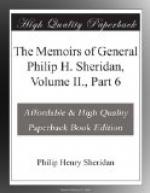As previously stated, Bismarck did not approve of the German army’s moving on Paris after the battle of Sedan. Indeed, I think he foresaw and dreaded the establishment of a Republic, his idea being that if peace was made then, the Empire could be continued in the person of the Prince Imperial who—, coming to the throne under German influences, would be pliable in his hands. These views found frequent expression in private, and in public too; I myself particularly remember the Chancellor’s speaking thus most unguardedly at a dinner in Rheims. But he could not prevent the march to Paris; it was impossible to stop the Germans, flushed with success. “On to Paris” was written by the soldiers on every door, and every fence-board along the route to the capital, and the thought of a triumphant march down the Champs Elysees was uppermost with every German, from the highest to the lowest grade.
The 5th of September we set out for Rheims. There it was said the Germans would meet with strong resistance, for the French intended to die to the last man before giving up that city. But this proved all fudge, as is usual with these “last ditch” promises, the garrison decamping immediately at the approach of a few Uhlans. So far as I could learn, but a single casualty happened; this occurred to an Uhlan, wounded by a shot which it was reported was fired from a house after the town was taken; so, to punish this breach of faith, a levy of several hundred bottles of champagne was made, and the wine divided about headquarters, being the only seizure made in the city, I believe, for though Rheims, the centre of the champagne district, had its cellars well stocked, yet most of them being owned by German firms, they received every protection.




